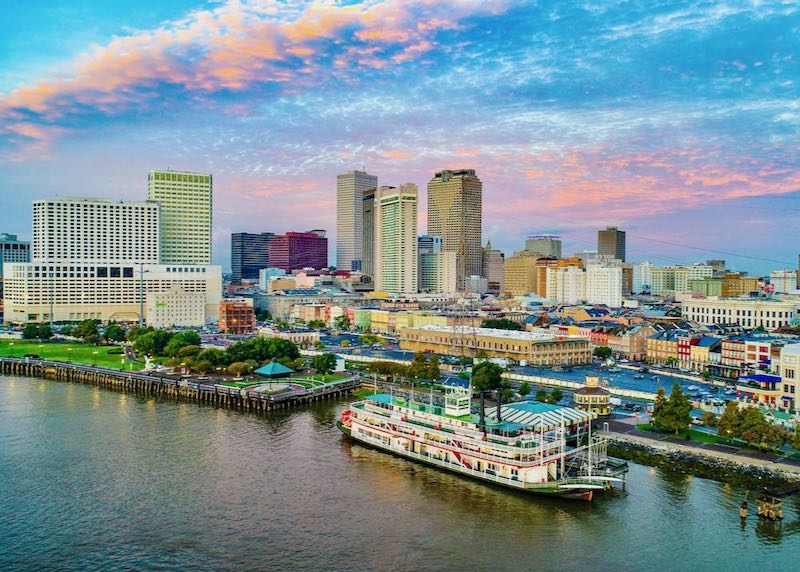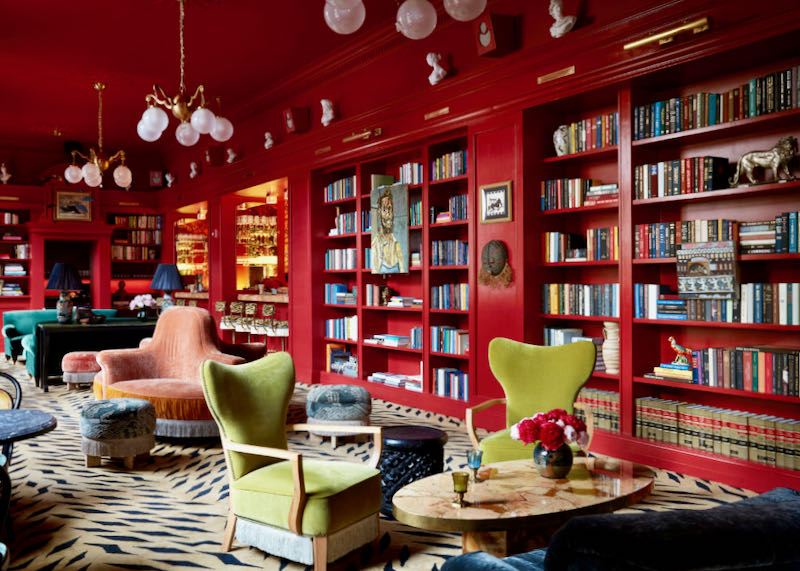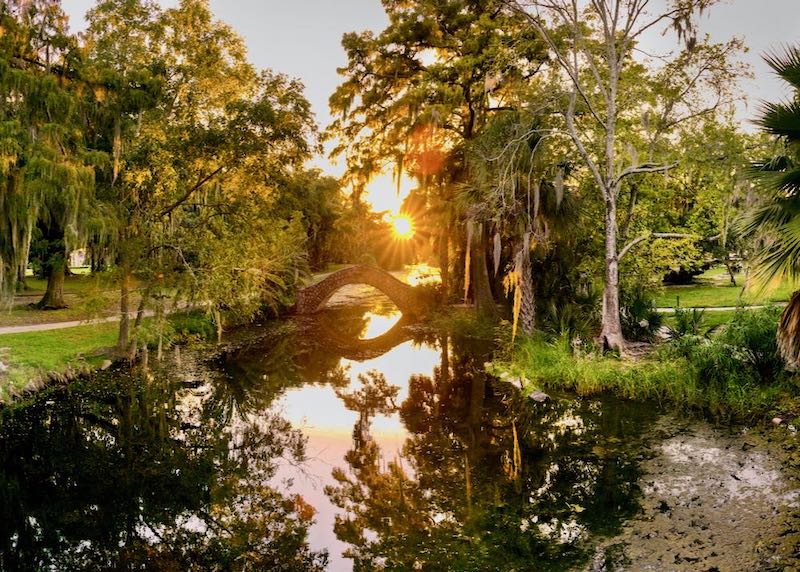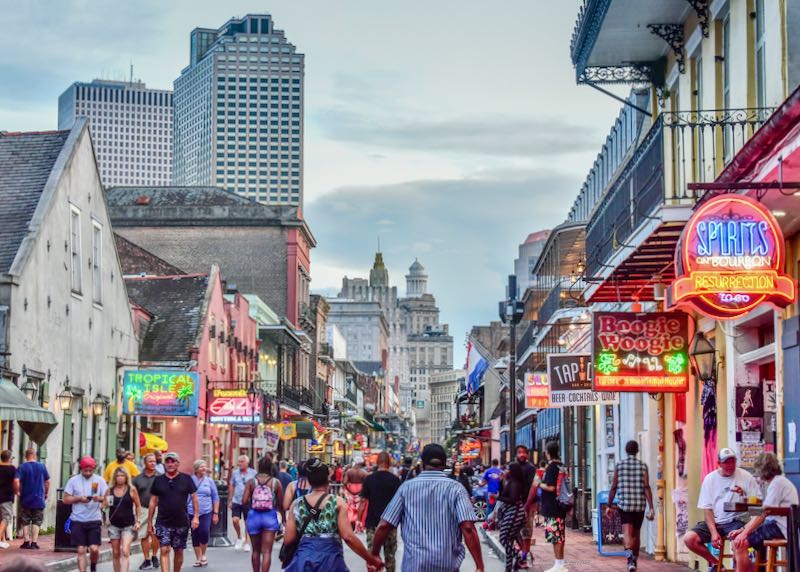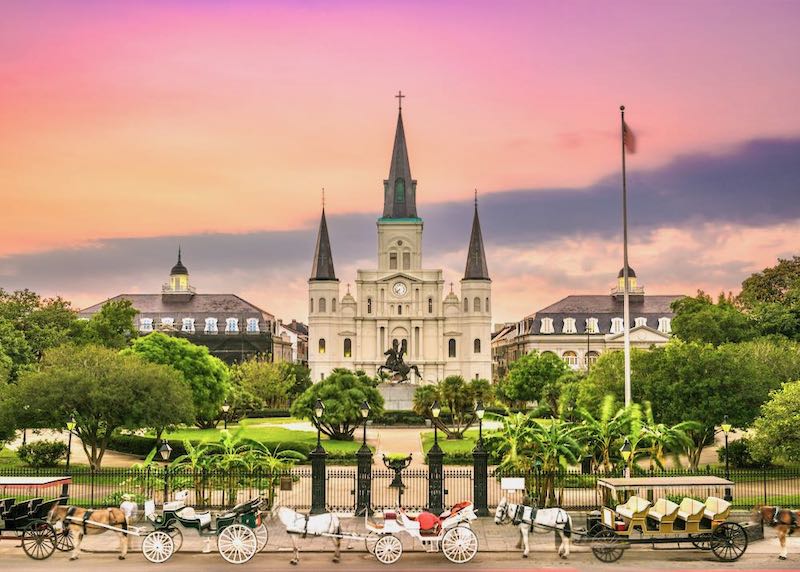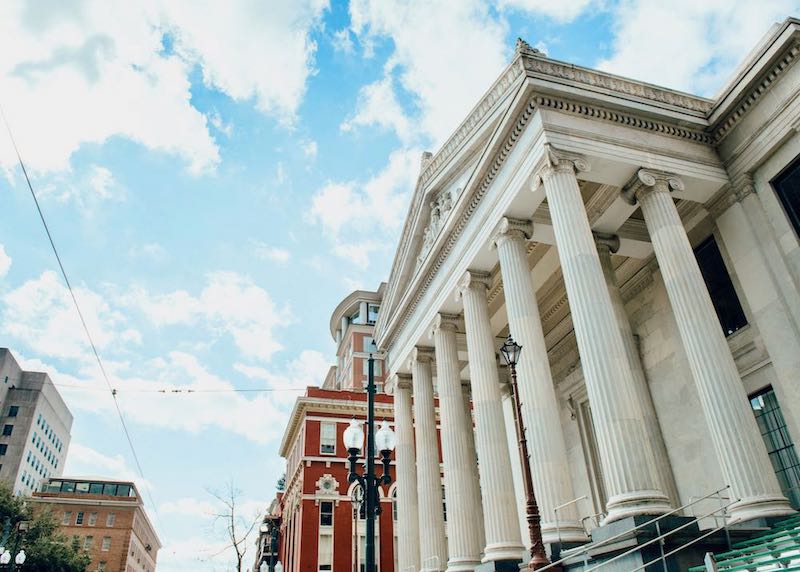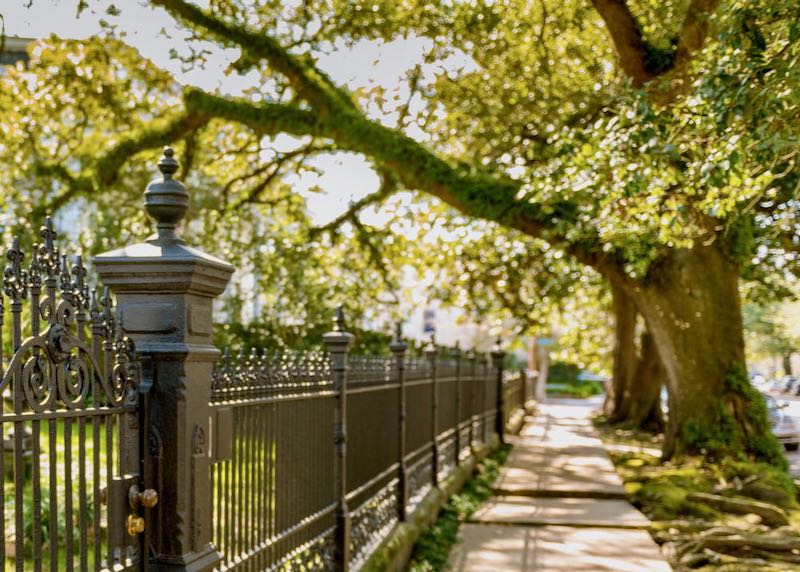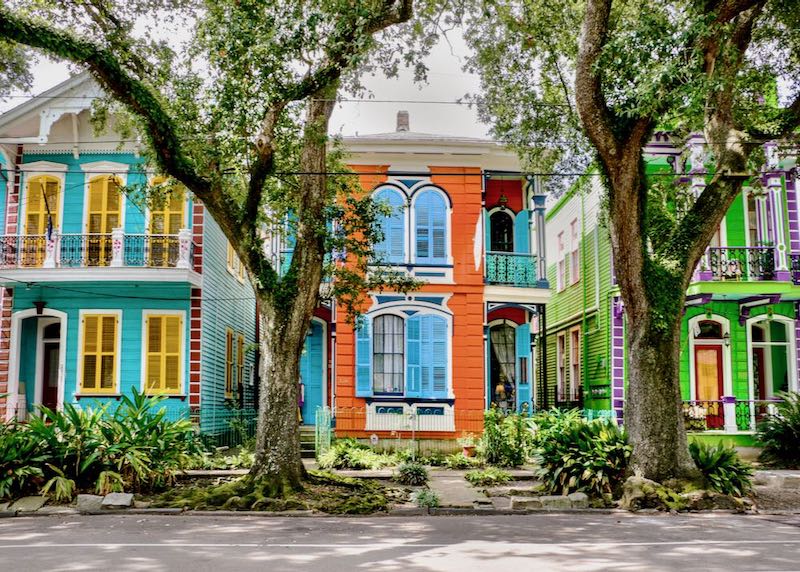By Seattle Dave
Our Favorite Hotels
• 5-Star: Maison Métier
• 4-Star: The Roosevelt
• 3-Star: Lookout Inn
• For Couples: Audubon Cottage
• For Families: The Roosevelt
• Best Pool: Windsor Court
• Near Airport: Holiday Inn
• Best French Quarter Hotel: Monteleone
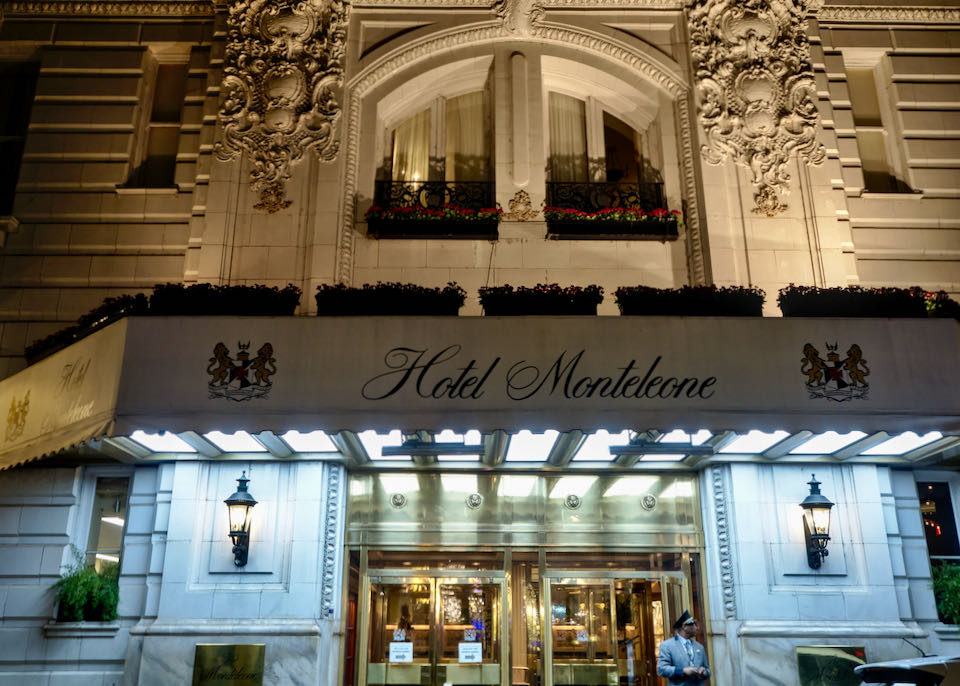
The historic Hotel Monteleone in New Orlean’s French Quarter.
The Best Areas to Stay in New Orleans
New Orleans cityscape at sunset with the French Quarter toward the right and the Central Business District on the left. Woldenberg Park is in the foreground along with the Mississippi River Pier.
New Orleans is a unique city with a rich, diverse heritage. Its culture is a blend of African, Caribbean, French, Spanish, Creole, Cajun, and Native American influences, which is evident in its distinct cuisine, music, language, and architecture. Jazz, a fusion of various musical styles, was born here. The city’s food is a flavorful mix of local ingredients and diverse culinary influences. You’ll find dishes featuring shellfish, wild game, smoked meats, and the famous mirepoix (onion, celery, and bell pepper). Rice dishes and pepper sauces with herbs are also popular. While most residents speak English, the distinctive “Yat” dialect is common, and only a few speak Cajun or Creole languages. Although New Orleans is known for its Voodoo spirituality, which combines West African religion and Catholicism, only a small number of locals practice it devoutly. Some interesting local customs include the use of “go-cups” for taking alcoholic beverages to-go from restaurants and bars, calling neighborhoods or suburbs “faubourgs,” and referring to the medians between traffic lanes as the “neutral ground.”
The French Quarter is the most well-known neighborhood in New Orleans, but there is more to the city than this convivial hotspot. In fact, with its pedestrian-friendly core and convenient streetcar system, New Orleans is an easy place to explore. Visiting several neighborhoods, even on a short trip, is highly recommended. The French Quarter is bordered by the Mississippi River to the east. Just northeast you’ll find the trendy Marigny and Bywater neighborhoods. The compact Tremé is northwest. To the south, Canal Street separates the Quarter from the Central Business District, home to offices and municipal buildings, and the Warehouse/Arts District, known for its museums and galleries. You can walk from the Quarter to all of these neighborhoods. To the southwest of the city’s bustling tourist- and business-oriented core, you’ll find the more residential Garden District and Uptown. Students at Tulane and Loyola Universities keep the scene from getting too sleepy. You can ride the St Charles Streetcar from Canal Street to the Garden District. Driving southwest from Canal Street on Magazine Street is a fun way to see several neighborhoods.
Locals often give directions according to the location of nearby bodies of water. Most of the tourist-friendly neighborhoods are tucked inside a broad, U-shaped bend in the Mississippi River. Longer thoroughfares like Magazine Street bend in sync with the river, so it’s easy to get confused when trying to orient yourself directionally. Locals will tell you to head upriver (which generally means west) or downriver (which is loosely east). North may be referred to as “lakeside,” because Lake Pontchartrain lies to the north of the city, and “riverside” means south toward the Mississippi River.
Best Places to Stay in New Orleans
The Maison Métier is the best five-star hotel in New Orleans.
- Best Luxury Hotels in New Orleans
Maison Métier • Ritz-Carlton • Windsor Court • The Roosevelt • Hotel Monteleone- Best Hotels for Families
Omni Royal Orleans Hotel • Best Western Plus St. Christopher Hotel • Holiday Inn New Orleans-Downtown Superdome- Best Honeymoon Hotels for Couples
Audubon Cottages • Hotel Peter and Paul • Henry Howard Hotel- Best Midrange Hotels in New Orleans
Le Pavillon Hotel • Pontchartrain Hotel St. Charles Avenue • The Eliza Jane • Drury Plaza Hotel- Best Cheap Hotels in New Orleans
Lookout Inn • Prytania Park Hotel • MOXY New Orleans Downtown/French Quarter • La Quinta Inn & Suites Downtown • The Quisby- Hotels on Bourbon Street
Hyatt Centric French Quarter • Astor Crowne Plaza • Lafitte Hotel & Bar • Bon Maison Guest House • Four Points by Sheraton • Royal SonestaBest Areas in New Orleans for…
City Park in Mid-City is a historic park dating to 1854. Spanning 1300 acres, the park offers a variety of family-friendly activities, including a botanical garden, Storyland playground/sculpture garden, New Orleans Museum of Art, Louisiana Children’s Museum, an amusement park, and more.
- Best Neighborhood for History and Sightseeing: French Quarter
Dating from 1718, the French Quarter is packed tight with fascinating historic buildings. The heart of the historic area is Jackson Square, where out-of-towners mingle with musicians, artists, and fortunetellers. The triple-spired St. Louis Cathedral, completed in 1794, overlooks Jackson Square. Its neighbor, the Cabildo, was the governmental headquarters during the Spanish Colonial period. Today the Cabildo is a state history museum. You can learn more about Mardi Gras at the nearby Presbytère Museum. Grab a chicory coffee and a fluffy beignet at Café du Monde, which opened in 1862. More than 200 years old, the nearby French Market is more of a tourist trap – think souvenirs and knickknacks – than a true farmers market, but it is a lively place to wander. There are numerous hotels in the Quarter. Just be aware that late-night revelry can be loud.- Best Neighborhoods for Dining: Garden District and Uptown
The entire city is a dining powerhouse, and you’ll find world-class eateries in every neighborhood. To dig in with locals, however, head to the Garden District and Uptown, plus a few spots in nearby Riverbend. Across these neighborhoods, you’ll find a slew of acclaimed chefs putting their individual spin on the region’s famous Creole and Cajun dishes. Many of these restaurants are tucked in residential streets in non-descript cottages. Inside, the decor is often white-linen fancy, while the vibe is neighborhood friendly. But it’s not all fine dining. Weathered shacks sell hearty local favorites like po’boys, crispy fried chicken, no-frills oysters, and colorful shave-ice snowballs. Trendy spots have staying power along Magazine and Freret Streets where you can dig into gourmet pizza, fancy burgers, and fusion bahn mi. Don’t skip a scoop of homemade ice cream from Creole Creamery.- Best Neighborhood for Nightlife and Live Music: Marigny
On the weekends, live music fans descend on Frenchmen Street in the Marigny. It’s a vibrant late-night scene on weekends, with crowds milling thick on the sidewalks outside the clubs. Street musicians add to the festive vibe. For jazz, head to Snug Harbor or The Spotted Cat. The amazing d.b.a. features blues singers, brass bands, and rock groups. Under a kilometer away, the Marigny Opera House, which occupies a former church, welcomes audiences for opera, theater, music, and dance performances. From Marigny, it’s just a short hop to the emerging St. Claude corridor, where you’ll find folk, alt-rock, punk, reggae, and metal bands. In other words, just about everything. Bars in the evolving neighborhood are similarly diverse, ranging from sleek to sexy to divey, with a few low-key neighborhood bars perfect for kicking back with a local craft beer.- Best Neighborhood for First-Timers: Central Business District
The utilitarian Central Business District (CBD) is not going to win any awards for atmosphere, but it is jam-packed with hotels. There aren’t many budget options in the CBD, but you will find hotels catering to almost every type of traveler, including families, business travelers, Mardi Gras and Jazz Fest attendees, convention-goers, and those just here to have a good time. Hotels bordering Canal Street are within walking distance of Bourbon Street, but they tend to be quieter than accommodations in the French Quarter, especially late at night. The CBD is also a convenient launchpad for exploring most of New Orleans. The city’s four streetcar lines – Canal Street, St Charles Street, Riverfront, and Rampart – all connect with Canal Street. One-way fare is $1.25.
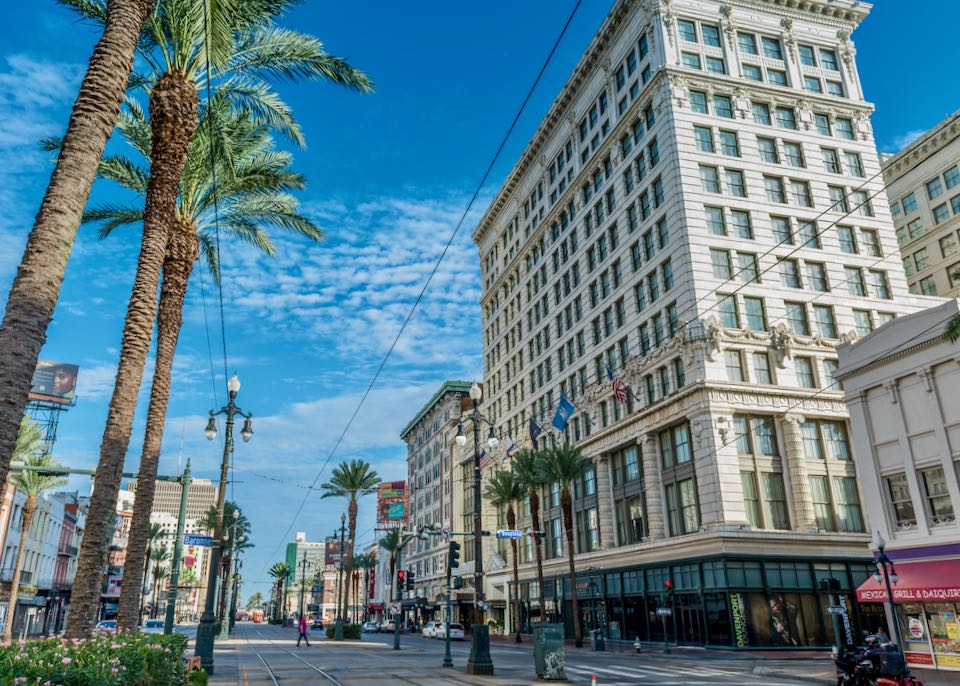
The historic Ritz-Carlton on Canal street. The Central Business District is to the left, the French Quarter to the right.
- Most Romantic Neighborhood: Garden District
With its leafy live oaks, stately mansions, and gracious B&Bs, the Garden District is easily the city’s most romantic neighborhood. The sidewalks are typically not crowded, making it easy to linger in front of the most charming old homes, where well-tended gardens, grand porches, and decorative wrought-iron fences whisper centuries-old stories of romance. Chic restaurants beckon along Magazine Street while dapper Commander’s Palace simply insists that you have a good time (be sure to dress sharply for the occasion). For a timeless end to your evening, stroll St Charles Avenue then climb aboard the streetcar for an old-school ride back to your start.- Best Neighborhood for Families: Central Business District
The best option for families is the Central Business District. The neighborhood is filled with large hotels, many of them with rooms and amenities that cater to families. Family-friendly attractions in and around the CBD include the National World War II Museum and the wonderful Audubon Aquarium of the Americas, which will soon hold exhibits from the recently closed Audubon Butterfly Garden & Insectarium. The Superdome hosts the New Orleans Saints pro football team. Streetcars link the CBD with neighborhoods across the city. The Algiers Ferry, which crosses the Mississippi River, docks at the end of Canal St. Sightseeing paddleboats depart nearby. Sprawling City Park – home to alligators, a carousel, Storyland, and the Louisiana Children’s Museum – is a short drive away in Mid-City.- Best Neighborhoods for Mardi Gras and Jazz Fest: Garden District and French Quarter
Scores of New Orleans social clubs, known as krewes, organize elaborate parades in the weeks leading up to Fat Tuesday. The Garden District is the best neighborhood for watching the parades and catching the coveted beads and trinkets. The most famous parades make their way down St Charles Avenue, the neighborhood’s main thoroughfare. Although very few parades pass through the narrow streets of the French Quarter, Bourbon Street itself devolves into the biggest party in the U.S. on Fat Tuesday – and it can be distressingly chaotic for many people. The French Quarter is a good place to stay for Jazz Fest, however, which is held three miles away at the state fairgrounds racetrack in late April and early May. There are quite a few B&B’s in Mid-City, but you’ll have the most lodging options in the Quarter.- Best Neighborhood for Walking: Garden District
Even if you’re not staying in the Garden District, carve out an hour or two to wander its atmospheric streets. On the riverside of St Charles Avenue, sidewalks roll past Greek Revival mansions with white columns, inviting porches, beautiful gardens, and wrought iron fences. Stately live oaks provide the shade. Be sure to explore Lafayette Cemetery No 1 and its graying above-ground tombs. The spooky vibe is tempered by the blue-and-white façade of its neighbor Commander’s Palace, a 100-year-old bon vivant where lunch is always a good time. Boutiques, galleries, restaurants – and several excellent dive bars – line trendy Magazine Street.- Unsafe Areas of New Orleans
Crime is an issue across New Orleans, and it is important to stay aware of your surroundings no matter the neighborhood, particularly at night. Travel in a group if possible. In the crowded French Quarter, violent crime is not generally a concern but petty theft may be an issue. Take particular care in Mid-City and Central City, which can get dodgy at night.Bourbon Street in the French Quarter gets crazy crowded during Mardi Gras, even though this is not the main parade route. This is for hardcore partiers only. For a good night’s rest, stay anywhere else in the city during the two weeks leading up to the holiday.
The Best Places in New Orleans for Tourists
1. French Quarter
Laid out in a compact grid and bordered by the Mississippi River, the Quarter is the oldest neighborhood in the city. Also known as the Vieux Carré (old square), the neighborhood is home to numerous historic buildings and a slew of top-notch restaurants and bars – but the neighborhood sees more tourists than locals. You’ll find a good selection of hotels, but they can be noisy. The Quarter’s main artery is Bourbon Street, which is lined with interchangeable tourist shops and rowdy bars. The wild crowds disperse on Royal Street, which holds block after block of boutiques, galleries, and antique stores. Creole townhouses are an architectural highlight, and many shops, restaurants, and hotels are tucked inside these elegant former homes, which are often fronted by hanging plants and cast-iron balconies.
- Best Hotels: Ritz-Carlton • Hotel Monteleone • Audubon Cottages • Bourbon Orleans • Bienville House • Grenoble House
2. Central Business District
Though lacking in attractions, the neighborhood is a good basecamp because all four of the city’s streetcar lines stop here. You can also easily walk to the French Quarter, the Warehouse/Arts District, and the Mississippi River. The Mercedes-Benz Superdome hosts concerts, conventions, and sporting events. The New Orleans Saints football team plays its home games here in fall and winter. Perhaps the biggest draw is the sheer number of hotels, which range from family-friendly to luxurious to gargantuan. The recent opening of several trendy boutique hotels has infused the CBD with a blast of contemporary cool. And some sweet rooftop bars.
- Best Hotels: Windsor Court • The Roosevelt Hotel • Le Pavillon Hotel • The Eliza Jane • MOXY New Orleans Downtown/French Quarter • La Quinta Inn & Suites Downtown
3. Warehouse/Arts District
This former industrial area, now an established cultural center, is home to a thriving mix of museums, galleries, boutiques, and acclaimed restaurants. There are good hotel options here, but you won’t have as many choices as you do in the CBD. The Aquarium of the Americas overlooks the Mississippi River at the end of Canal Street. The Riverwalk outlet mall and the sprawling Harrah’s Casino (soon to be Caesar’s) are nearby. The neighborhood is also home to the wonderfully immersive World War II Museum, a must-visit for history buffs. For great art, spend an hour perusing the varied works at the multi-story Ogden Museum of Southern Art. Galleries and studios border Julia Street. Several award-winning chefs have opened restaurants close to the museums and galleries.
- Best Hotels: Maison Métier • Drury Plaza Hotel • Cambria Hotel New Orleans Downtown Warehouse District • Lafayette Hotel
4. Garden District and Uptown
Lodging is a bit scarce, but you will have a solid selection of B&Bs, inns, and smaller hotels in the Garden District and its neighbor Uptown. The St Charles Streetcar is an easy way to get to the columned mansions, leafy sidewalks, and bustling colleges. But there’s more to the neighborhood than live oaks and historic homes. Lafayette Cemetery No. 1 tells the story of the city through the epitaphs on its aging tombstones. The Louisiana Swamp exhibit in the Audubon Zoo in Audubon Park spotlights creatures from the Cajun bayous. Magazine Street is the convivial heart of the neighborhood, with indie coffee shops, buzzy restaurants, and classy boutiques. Dive bars keep the street festive from dusk until dawn.
- Best Hotels: Henry Howard Hotel • Pontchartrain Hotel St. Charles Avenue • The Prytania Park Hotel • The Quisby • Hampton Inn New Orleans/St. Charles Ave
5. Marigny and Bywater
These burgeoning riverfront neighborhoods exude up-to-the-minute boho cool, but Creole cottages, shotgun shacks, and the Mississippi River keep these enclaves firmly rooted in New Orleans. With avant-garde galleries, trendy restaurants, and funky outdoor bars, Marigny and the Bywater are good places to kick back, enjoy a fantastic meal, and commune with friends. Foodies won’t want to miss the global array of choices at St. Roche Market in the Bywater. For late-night live music of all sorts head to Frenchmen Street and the burgeoning St Claude corridor. Stop by Crescent Park for fine views of the Mississippi River. These neighborhoods are easy to explore by bicycle. The predominant lodging choices are B&Bs, small inns, and boutique hotels.
- Best Hotels: Hotel Peter and Paul • The Lookout Inn • Royal Frenchmen Hotel and Bar
6. Tremé and Mid-City
Black history and culture are celebrated in Tremé and Mid-City, two long-established neighborhoods worthy of a deep dive, especially for those interested in the city’s multicultural beginnings and on-going traditions. B&Bs – some funky, some refined – are the primary lodging option here. Marie Laveau, the voodoo queen, is buried in the eerie St Louis Cemetery No 1. The Backstreet Cultural Museum delves into the fascinating history of the neighborhood’s Mardi Gras Indians and the history of Second Line parades. For classic Creole cuisine, stop for lunch at Dooky Chase’s, where civil rights leaders once gathered. Esplanade Ave and its grand French Creole homes link Tremé with City Park, a lush and sprawling green space in Mid-City that’s home to an art museum, a sculpture garden, botanical gardens, and a variety of kid-friendly attractions.
- Best Hotels: Monrose Row Bed & Breakfast • La Belle Esplanade • The Brakeman Hotel
